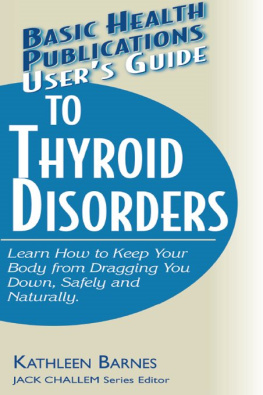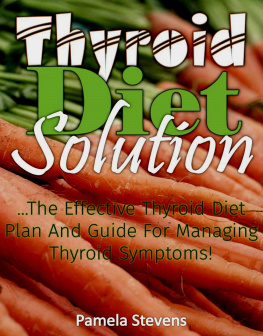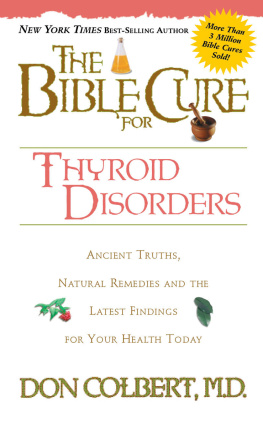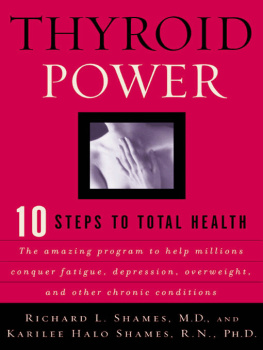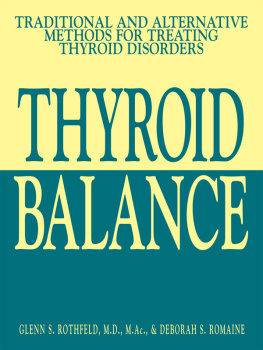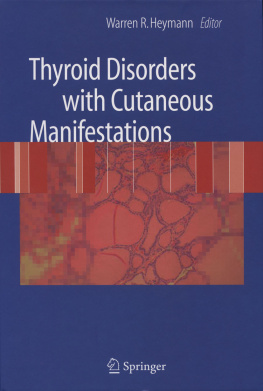OTHER BOOKS AND RESOURCES
Ahlgrimm, Marla, and Kells, John M. The HRT Solution (Avery, 1999).
Barnes, Kathleen. Users Guide to Natural Hormone Replacement (Basic Health Publications, 2005).
Blumenthal M., ed. The Complete German Commission E Monographs: Therapeutic Guide to Herbal Medicines. Boston, Mass: Integrative Medicine Communications, 1998.
Brownstein, David. Iodine, Why You Need It, Why You Cant Live without It (available through his website, www.drbrownstein.com).
Cass, Hyla, and Barnes, Kathleen. 8 Weeks to Vibrant Health (McGraw-Hill, 2004).
Langer, Stephen, and Scheer, James. Solved: The Riddle of Illness (Keats, 2000).
Moore, Elaine and Lisa. Graves Disease: A Practical Guide (McFarland and Co., 2001).
Shames, Richard L., and Shames, Karilee. Thyroid Power (Quill, 2002).
Shomon, Mary. Living Well with Hypothyroidism (Quill, 2005).
Shomon, Mary. The Thyroid Diet (Harper Collins, 2004).
Siegal, Sanford. Is Your Thyroid Making You Fat? (Warner Books, 2000).
Teitelbaum, Jacob. From Fatigued to Fantastic (Avery, 2001).
To find the best doctors for thyroid disorders:
Mary Shomons Thyroid Top Doctors Directory: www.thyroid-info.com/topdrs
Armour thyroid/Thyrolar doctor database: www.armourthyroid.com/locate.html
American Osteopathic Association: www.aoa-net.org
American Holistic Medical Association: www.holisticmedicine.org
Websites:
Broda Barnes Foundation: www.brodabarnes.org
Mary Shomons thyroid website: www.thyroid.about.com
Dr. Jacob Teitelbaums website: www.vitality101.com
Thyroid Foundation of America: www.allthyroid.org
Kripalu Yoga Centers: www.kripalu.org
(In my mind, the best yoga teachers around.)
Magazines:
GreatLife Magazine
Consumer magazine with articles on vitamins, minerals, herbs, and foods.
Available for free at many health and natural food stores.
Lets Live Magazine
Consumer magazine with emphasis on the health benefits of vitamins, minerals, and herbs.
Customer service:
1-800-676-4333
P.O. Box 74908
Los Angeles, CA 90004
Subscriptions: 12 issues per year, $19.95 in the U.S.; $31.95 outside the U.S.
Physical Magazine
Magazine oriented to body builders and other serious athletes.
Customer service:
1-800-676-4333
P.O. Box 74908
Los Angeles, CA 90004
Subscriptions: 12 issues per year, $19.95 in the U.S.; $31.95 outside the U.S.
The Nutrition Reporter newsletter
Monthly newsletter that summarizes recent medical research on vitamins, minerals, and herbs.
Customer service:
P.O. Box 30246
Tucson, AZ 85751-0246
e-mail:
www.nutritionreporter.com
Subscriptions: $26 per year (12 issues) in the U.S.; $32 U.S. or $48 CNC for Canada; $38 for other countries
SELECTED REFERENCES
American Association of Clinical Endocrinologists. Thyroid hormone missing from menopause discussion for millions of women. News release, January 13, 1999.
Adline, V. Subclinical hypothyroidism: Deciding when to treat. American Family Practice Magazine, February 15, 1998 (online edition).
Bunevicius, R., Kazanavicius, Z., Zalinkevicius, R., et al. Effects of thyroxine as compared with thyroxine plus triiodothyronine in patients with hypothyroidism. New England Journal of Medicine, 1999; 340(6): 424429.
Gaby A.R. Sub-laboratory hypothyroidism and the empirical use of Armour thyroid. Alternative Medicine Review. 2004; 9(2):157179.
Jackson, A.S. Hypothyroidism. Journal of the American Medical Association 1957, Sep 14; 165(2): 121124.
Lowe, J.C. Thyroid status of 38 fibromyalgia patients: Implications for the etiology of fibromyalgia. Clinical Bulletin of Myofascial Therapy, 1997; 2(1):4764.
Mabuchi, H., Higasawa, T., Kawashiri, M., et al. Reduction of serum ubiquinol-10 and ubiquinone-10 levels by atorvastatin in hypercholesterolemic patients. Journal of Atherosclerosis and Thrombosis 2005; 12(2):111119.
Muller, B., Zulewski, H., Huber, P., et al. Impaired action of thyroid hormone associated with smoking in women with hypothyroidism. New England Journal of Medicine, 1995; 333(15):10011002.
CHAPTER 1
THE BASIC SCIENCE
M ost of us are aware that the thyroid secretes a variety of hormones. What you may not realize is that these hormones affect virtually every one of the trillions of cells in your body and every single body function. Without these hormones, you cannot survive in the long term.
The late Broda Barnes, M.D., pioneer of thyroid research and treatment, once wrote about his participation in a medical school experiment: Students were shocked at the rapid deterioration of a small rabbit after removal of its thyroid. Previously warm at room temperatures, active, and alert, the animal now shivered with cold, moved in slow motion, drugged with fatigueas if old and feeble. Its skin was scaly, its mucous membranes were infectedparticularly in the respiratory systemand its heartbeat and muscles were weak.
Sound familiar? The thyroid has been likened to a gas pedal, producing hormones that fuel your entire body. To stretch out the metaphor to the breaking point, when you have a lead foot and push on the gas pedal too hard for too long, your car first runs out of gas and eventually breaks down, usually at the most inconvenient time. Thats whats happening when the thyroids hormone production begins to deterioratetheres simply been too much pressure on the little gland for too long.
Thyroid Function 101
Your thyroid produces several types of hormones. The two most important are T3 (triiodothyronine) and T4 (thyroxine). These two help get oxygen into your cells, and the oxygen burns calories. In other words, they control your metabolism. Imagine what would happen if there were no oxygen in your cells and no calories burning. It might look very much like Dr. Barnes poor rabbitor like you, if youre suffering from hypothyroidism. The cells of the thyroid gland are the only ones in your body capable of using iodineand with the help of tyrosine molecules, iodine helps your body form T3 and T4. In fact, the 3 and 4 in these two hormones refers to the number of iodine molecules in each molecule of thyroid hormone.
Triidothyronine (T3)
The biologically active hormone; comprises 20 percent of thyroid hormone produced by your body; of the two, it is the stronger hormone.
A healthy thyroid produces about 80 percent T4 and 20 percent T3, even though T3 has four times the hormone strength of T4. The additional T3 your body needs is converted from T4 in other organs, including the liver and the hypothalamus, a part of your brain. The hypothalamus plays another important function: It regulates the thyroids production of T3 and T4 by telling the pituitary gland to release TSH or thyroid-stimulating hormone.
Thyroxine (T4)
The most plentiful thyroid hormone; it constitutes about 80 percent of thyroid hormone produced by your body, and is converted to T3 by the liver and hypothalamus.
In their book Thyroid Power, Drs. Richard and Karilee Shames call thyroid a tiny but powerful throttle mechanism, because the energy hormone it produces (T3) acts like a gas pedal for the rest of the body. But when the production or circulation of T3 and T4 are out of whack, the hypothalamus and pituitary try to correct the shortfall by sending out more TSH, asking for more production of the essential thyroid hormones.
Causes of Thyroid Malfunction
Thyroid malfunction is caused by a wide variety of factors, including the chronic stress of the fast-paced life most of us live.
Next page
